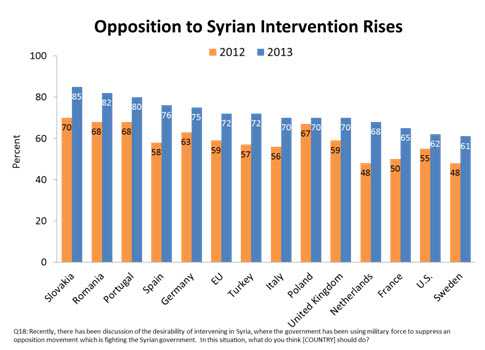Full Survey to be released September 18, 2013
Washington D.C. (Sept. 6, 2013)– Europeans and Americans are not in favor of military intervention in Syria, according to prereleased data in the 12th annual Transatlantic Trends survey.
Transatlantic Trends 2013 is an annual survey of U.S. and European public opinion conducted by the German Marshall Fund of the United States (GMF) and the Compagnia di San Paolo, with additional support from the Fundação Luso-Americana, the BBVA Foundation, the Communitas Foundation, the Swedish Ministry for Foreign Affairs, and the Barrow Cadbury Trust. Eleven European Union member states were surveyed: France, Germany, Italy, the Netherlands, Poland, Portugal, Romania, Slovakia, Spain, Sweden, and the United Kingdom, as well as the United States and Turkey. Polling was conducted by TNS Opinion between June 3 and June 27, 2013. In Turkey, polling was suspended for a week and was completed by July 2, 2013.
In the survey, respondents were told that there had recently been discussion of the desirability of intervening in Syria, where the government has been using military force to suppress an opposition movement. They were then asked whether their government should stay out completely or intervene. A two-thirds majority in the United States (62%, up 7 percentage points from 2012) along with nearly three-fourths of respondents in Europe (72%, up 13 percentage points from 2012) preferred to stay out.
Only one-in-three respondents in the United States (30%, down 5 percentage points from 2012) and even fewer in Europe (22%, down 10 percentage points from 2012) felt their countries ought to intervene in Syria.
In Turkey, 72% of respondents said their country should stay out of Syria (up 15 percentage points), while only 21% (down 11 percentage points) favored intervention.

*Polling was conducted between June 3 and June 27, 2013. In Turkey polling was suspended for a week and completed by July 2, 2013.
In a separate question about recent developments in North Africa and the Middle East, respondents to the survey were asked to choose between two propositions: “stability is more important even if it means accepting non-democratic governments” and “democracy is more important even if it leads to a period of instability.” A majority in Europe (58%) and a plurality in the United States (47%) preferred democracy over stability.
A majority of Turkish respondents (57%) preferred democracy in Northern Africa and the Middle East; 25% said they preferred stability, while 18% answered that they did not know or refused to answer.
Topline data is available here. Read GMF experts’ analyses on Syria.
Commentary Available
GMF has experts that can comment on the ongoing crisis in Syria and developments from the G20 Leaders’ Summit. All our experts can participate in print, radio, and television interviews.
Please contact: Sarah Halls, [email protected],  +32 484 491 078 .
+32 484 491 078 .
The full Transatlantic Trends 2013 data will be released on September 18, 2013
***
The German Marshall Fund of the United States (GMF) strengthens transatlantic cooperation on regional, national, and global challenges and opportunities in the spirit of the Marshall Plan.
GMF does this by supporting individuals and institutions working in the transatlantic sphere, by convening leaders and members of the policy and business communities, by contributing research and analysis on transatlantic topics, and by providing exchange opportunities to foster renewed commitment to the transatlantic relationship.
In addition, GMF supports a number of initiatives to strengthen democracies. Founded in 1972 as a non-partisan, non-profit organization through a gift from Germany as a permanent memorial to Marshall Plan assistance, GMF maintains a strong presence on both sides of the Atlantic. In addition to its headquarters in Washington, DC, GMF has offices in Berlin, Paris, Brussels, Belgrade, Ankara, Bucharest, Warsaw, and Tunis. GMF also has smaller representations in Bratislava, Turin, and Stockholm.
Follow GMF on Facebook and Twitter.
About GMF Editor
mena, Syria
